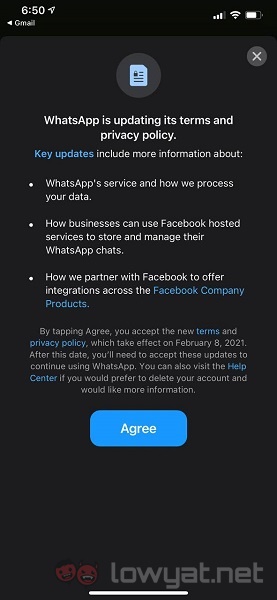Things did not go well for WhatsApp when it introduced its new terms and conditions for its privacy policy back in January. Specifically, the Facebook-owned messaging app required users to agree with the changes, therefore allowing it to share certain data with its parent company. Due to a huge backlash from users regarding the announcement, WhatsApp has decided to delay the changes to 15 May.
So what will happen if you decided not to agree with the new policy by then?
The messaging app has recently updated the security and privacy page on its website explaining the effects that will be put in place, should users refuse to accept the changes. According to WhatsApp, you’ll still be able to receive calls and notifications for a couple of weeks after implementation. However, it also noted that you won’t be able to read or send messages, and make any form of calls to your contacts – therefore rendering the app to be as useful as a mesh face mask during a pandemic.

WhatsApp did not go into detail on what would happen after prolonged refusal of accepting the new terms. It is possible that the service will continue to maintain the restrictions until users finally decide to give in. That is, provided that they’ve not already jumped to other messaging platforms that are welcoming an exodus of new users after the initial backlash.
There have been some speculations suggesting that the service will delete a user’s account due to inactivity caused by the restrictions. However, that doesn’t seem to be the case as Whatsapp will only wipe accounts that are not connected to the internet after 120 days, according to its website. So if you’re still acknowledging notifications and answering calls from the app, it would still count as to being active. Of course, this may change if the service decides to impose even more restrictions in the long run.

The service also pointed out that you can still export your chat history on Android or iPhone, and down a report of your account before 15 May. Whether this ability will be taken away from the user after the date of implementation was not specified, so it’s best to take note of this just in case. Furthermore, it is also asking users to reconsider deleting their WhatsApp accounts, saying that the move is irreversible and will forever erase all message history and backups on Google Drive and iCloud.
WhatsApp also recently added a new FAQ page on its website to further explain its new privacy policy, in an attempt to persuade users into accepting the changes. The service ensured that WhatsApp and Facebook will not have the ability to access or keep logs of your personal messages or calls after the implementation – the same applies to in-app chat groups as well. It added that location sharing is only kept between the user and their contacts, and by providing the service permission will only allow it access to phone numbers from your contact list in order to “make messaging fast and reliable.”

The service continued to emphasise throughout the FAQ that it does not share a user’s personal information with Facebook for ads purposes. However, it did note earlier in January that sharing of data only applies when a user interacts with a business on its platform, specifically those that use Facebook’s hosting services.
Whether you choose to accept the new changes or not remains entirely up to you. Usually the downside of leaving the platform is that you’d lose all of your chat and call history. But this is no longer the case as both Signal and Telegram now let users transfer their WhatsApp chats over in just a few steps, therefore enabling them to continue where they left off.
Here's how you can move your chats to Telegram if you're on Android. pic.twitter.com/VMq3mAeteq
— Telegram Messenger (@telegram) January 28, 2021
So what are you planning to do once the new privacy changes are implemented later in May? Will you accept the new policy and continue using Whatsapp, delay a while more just to see what would happen, or have you already switched over to the other messaging platforms? Let us know in the comments.
Follow us on Instagram, Facebook, Twitter or Telegram for more updates and breaking news.



